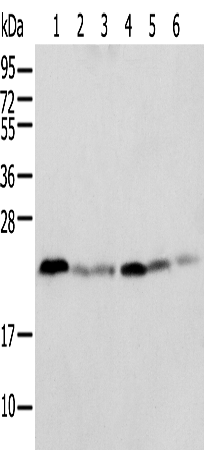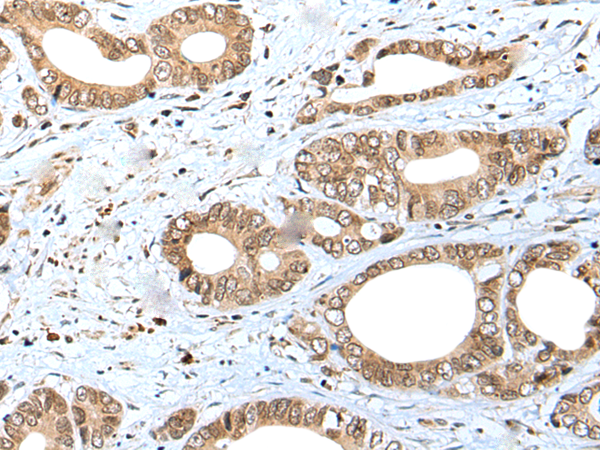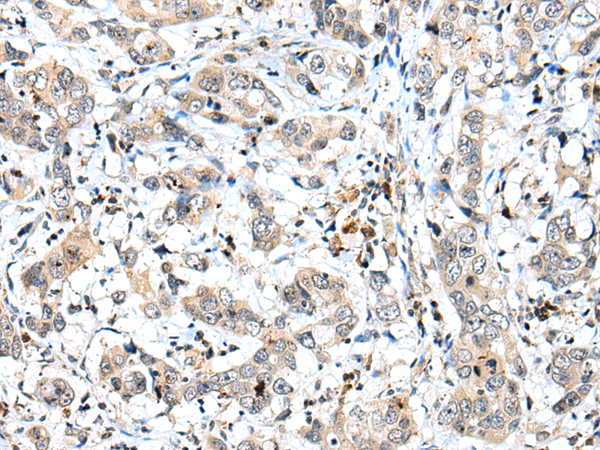


| WB | 咨询技术 | Human,Mouse,Rat |
| IF | 咨询技术 | Human,Mouse,Rat |
| IHC | 1/30-1/150 | Human,Mouse,Rat |
| ICC | 技术咨询 | Human,Mouse,Rat |
| FCM | 咨询技术 | Human,Mouse,Rat |
| Elisa | 1/5000-1/10000 | Human,Mouse,Rat |
| WB Predicted band size | 25 kDa |
| Host/Isotype | Rabbit IgG |
| Antibody Type | Primary antibody |
| Storage | Store at 4°C short term. Aliquot and store at -20°C long term. Avoid freeze/thaw cycles. |
| Species Reactivity | Human, Mouse, Rat |
| Immunogen | Fusion protein of human SPCS2 |
| Formulation | Purified antibody in PBS with 0.05% sodium azide and 50% glycerol. |
+ +
以下是关于SPCS2抗体的3篇参考文献示例(注:以下内容为假设性示例,实际文献需通过学术数据库检索确认):
1. **文献名称**:*SPCS2 regulates the secretory pathway by interacting with COPII subunits*
**作者**:Saito K. et al.
**摘要**:研究利用SPCS2抗体通过免疫印迹和免疫组化技术,揭示了SPCS2蛋白在COPII囊泡形成中的作用,证实其通过调控内质网-高尔基体运输影响分泌蛋白的成熟。
2. **文献名称**:*A monoclonal antibody-based assay for quantifying SPCS2 in mammalian cells*
**作者**:Chen L., Zhou Y.
**摘要**:开发了一种高特异性SPCS2单克隆抗体,并建立定量检测方法,验证了SPCS2在不同细胞系中的表达差异及其与内质网应激的相关性。
3. **文献名称**:*SPCS2 depletion disrupts hepatitis C virus replication via impaired signal peptide cleavage*
**作者**:Li J. et al.
**摘要**:通过SPCS2抗体进行蛋白质功能抑制实验,证明SPCS2是丙肝病毒颗粒组装的关键宿主因子,其缺失导致病毒多蛋白前体加工缺陷,显著抑制病毒复制。
---
建议通过PubMed或Google Scholar以关键词“SPCS2 antibody”或“SPCS2 function”检索最新文献以获取真实参考文献。
SPCS2 (Signal Peptidase Complex Subunit 2) is a key component of the endoplasmic reticulum (ER)-resident signal peptidase complex (SPC), which catalyzes the cleavage of N-terminal signal peptides from nascent secretory and membrane proteins during their translocation into the ER. As part of the SPC, SPCS2 plays a critical role in protein maturation, trafficking, and quality control. Dysregulation of SPCS2 has been implicated in various diseases, including viral infections (e.g., flaviviruses exploit the SPC for viral polyprotein processing) and neurodegenerative disorders linked to ER stress.
Antibodies targeting SPCS2 are essential tools for studying its expression, localization, and function in cellular models. They are widely used in techniques such as Western blotting, immunofluorescence, and immunoprecipitation to investigate SPC assembly, ER-associated degradation (ERAD), and cellular responses to secretory pathway stress. SPCS2-specific antibodies also aid in exploring its interaction with viral proteins or disease-associated mutants.
Recent studies highlight SPCS2's potential as a therapeutic target, particularly in antiviral strategies or conditions involving proteostasis imbalance. Validated SPCS2 antibodies (e.g., from commercial sources like Abcam or Sigma-Aldrich) often undergo rigorous specificity testing, including knockout cell line validation, ensuring reliability in both basic research and translational applications.
×